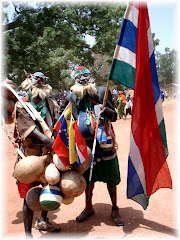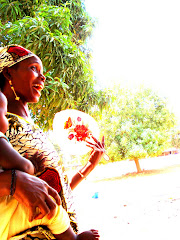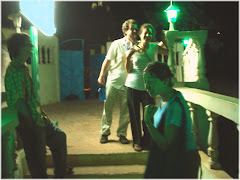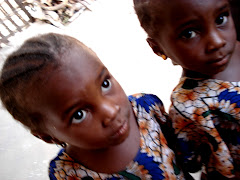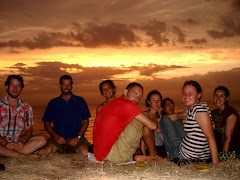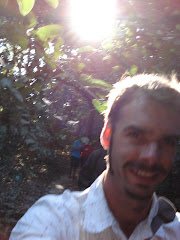Monday, April 28, 2008
Sometimes its hard to go back to site
I helped out at IST last week especially with the beekeeping and composting components. The bees here are very different from those at my site. Its probably because we were working at Sifoe Beekeeping Kaafo and National Beekeeping Association of The Gambia where the colonies are more used to being disturbed. I only got stung a few times through my suit even though I led three groups on three separate nights. Training people about keeping bees has been very rewarding for me. It's a little easier when they are all English-speakers like it was with my fellow PCVs. I hope that I can continue to work with beekeeping and development after Peace Corps is finished. I feel like it is a very sustainable practice and that many people in developing countries can benefit economically from it: The farmers from the pollination, the beekeepers from the honey. Working in other people's established apiaries can be difficult though because I am a visitor there and have certain opinions about management that the operators might not share.
Hanging out in Kombo is so weird after being at site. The Stodge (our Transit House in Fajara) is the closest I've been to a fraternity house atmosphere in a very long time. It has enough beds for 40 people, a very messy kitchen, and an entertainment center. Volunteers from all over the country come there when they need a break from site so debauchery ensues. Late nights, beer drinking, loud music. I might have thought that it wouldn't be a very attractive environment but I have to admit that I actually enjoy being there. I am quite close with many of my fellow Volunteers. Also, PCVs get to know one another quickly because of the nature of our lives. Someone you've never met before might become your cooking partner or fall asleep on you watching a movie. Peace Corps can be sort of frustrating so we depend on one another to help us cope and relax. Also, there is an extensive bootleg collection of dvds so I got to watch the very excellent No Country For Old Men which was filmed in New Mexico. It made me homesick in a very pleasing sort of way. I miss that place so much and the scenery in that film reminded me of so many places that I have loved.
So I hope that you are all well. I have received a few comments from people I don't even know which I am very happy about. Thank you for your kind words and encouragement. Its probably time to get sowing seeds in America and I hope that you are each planting a few.
I've posted some photographs at http://picasaweb.google.com/knucklewalking/TheGambia
Also, my brother and his wife are set to have a baby in the next 2-3 weeks. I wish them success and happiness. My village is very happy for them and we will slaughter a goat to celebrate the occasion.
Kaira,
Matt
Sunday, April 27, 2008
April 15
Another month in village (where things are starting to heat-up, in more ways than one) and now back to Kombo for the Agroforestry In-Service Training (IST) and to cheer on the new Health Volunteers who are swearing-in this week. Seems like only yesterday that that idealistic and enthusiastic young Trainee was me- obsessing about language, culture, an all-rice diet, and the heat. Well, I still worry about all those things. And plenty more that hadn’t yet even occurred to me then. But nevermind. Now I give them my best wizened look, scratch at some incessant bug-bite, and tell them that they’ll be just fine.
As I write this I am perched high above Fajara where an ocean breeze cools my espresso on the balcony of Timbooktoo, the bookstore and café where wireless internet is free with any purchase. Gambians love their Nescafe’ and its hard to find a good cup of coffee anywhere but there are two places I know of in this country that offer the finer things.
When will I learn to trust my woman’s intuition? (Mine I mean, I have no woman and she has no intuition). I knew I had to be in Kombo by Tuesday morning for a meeting at the Forestry Department and last Saturday I began to feel like I should not depend on things going smoothly. Two of the three gelegeles that leave from my neck of the woods have broken down along the road somewhere and haven’t been seen for weeks which left me counting on Molafi for my transportation to Kombo. On Saturday I went to his house where his kin assured me that he would be going on Monday. Inshallah. If Allah wills it, he will go. So on Monday morning I awoke at 5:30 and hefted my duffel of clothes and my burlap sack that I had sewn closed after stuffing with three beesuits, three pairs of boots, and all the tree seeds I’ve collected for the IST seed exchange (winterthorn, moringa, yellow cassia, flamboyant, pigeon pea, and pignut). I am building my neck muscles and so was able to carry one bag on my head like any good Gambian would, the other slung over my shoulder American-style. I hiked about four kilometers through the rice field before the cocks crowed but the bees were already awake and I could hear them in every gmelina I walked under. When I arrived at Kangsambu the aparante (boy who rides in a gelegele and negotiates tying the goats to the roof, haggling fares, and stuffing as many sweating human animals into a dusty metal box as physics will allow) was scratching his head looking forlorn at the flat tire. I knew it. Luckily, they had a spare. Unluckily, as soon as the thirtieth person climbed aboard in Kangsambu we began to hear the telltale hissing sound from said spare. We all climbed out and the aparante borrowed a bike pump from someone but it was mostly ineffective (due of course to the hole) so Molafi rigged some sticks to the rear forks of a borrowed bicycle and sent the boy with the flat tire to Kalagi (at least ten k away) to get it repaired. We sat in the dirt. About three hours passed and then Molafi threw my rice bag to me from the roof and told me that we’ll go tomorrow inshallah. So I humped all my stuff back home where my host family had a chuckle. But I couldn’t give up so with the help of my host-brothers’ wives Fatou and Syrah, we tied my bags to my bike with the shredded inner-tubes that are used as straps here and I set off on a wobbly and precarious ride to Kalagi. There I left my bike in the hands of some local police officers who, with a disturbing wink and grin, assured me that they’d take real good care of it. I’ll be surprised if I will ever see it again. Then I went to sit along the main road with about thirty other travelers with burlap sacks and waited in the sun and the dust. Because it is a police checkpoint, all vehicles are required to stop whereupon the riders are accosted by young girls hawking bananas, coconut slices, and plastic bags of water and the aparantes by stranded nomads who insist “Sure, you can squeeze me in right next to those chickens and sheep. Come on.” It took a while before I really asserted myself but I realized that if I didn’t push and shove like everyone else I’d be sleeping right there that night and I eventually got aboard an already crowded vehicle coming from further up-country. We eventually were impeded by a flat tire in Sibanor and then eventually made it to Serekunda where I eventually caught a taxi to Latrikunda and then another to --eventually—Fajara, my destination.
Things at site have been up and down this month. Most of my fellow Volunteers are experiencing the same. Gambians love to say “it is not easy.” Nothing is. I’ve been really experiencing some difficulties at site with the work that I want to do. For example, I have a hammer. Not many people here have hammers. Ali Dado asked to borrow mine and when he gave it back twenty minutes later it was in five pieces. How do you break a tine from the claw, the head from the body, the body from the handle, and the handle into two pieces? If you asked me to break a hammer and gave me six weeks to do it I’d be lucky to make it into two pieces. I had called a workday at the womens’ garden for the following day to repair the fence so that all the hungry cows, sheep, and goats wouldn’t be able to eat our modest crops. So I showed-up ready to pound fence nails with a rock. The garden is a total loss.
But I cannot totally blame that on the hammer. All gardeners no matter where they live struggle with nature and Gambians are no exception. Pests, climate, soil, germination, weeds. All these and more. The
A few weeks ago while in the garden I noticed that there was a goat eating some woman’s bitter tomato plants. I chased him with a stick and he ran out of a hole in the fence that I then repaired. The next day I noticed another goat and a sheep eating okra and eggplants. I chased them with dirt clods and they each went out through two new holes. I repaired those. The next day four goats, six sheep, and two cows. I chased them with sticks, clods, and a pitchfork. They evacuated through holes except for the cows who jumped over the four foot wire mesh and barbed wire fence that had been donated from NGOs Concern Universal and
So in addition to the livestock and other pests, to the sun and the wind and the drought, to the lack of soil fertility, another obstacle to raising food is the people’s attitudes and abilities. And here is where I feel absolutely unprepared as a development worker. I have spent the last few years studying food production in difficult climates, researching organic methods and permaculture systems, fraternized with extension workers and farmers. But sometimes theory and practice do not meet. Good ideas. I have a particular vision, I’m not at all sure that the people I am working with share in that vision. For one thing, I come from
The men of my village told me last week that the rains last year came late and ended early and their harvests of groundnuts and millet were disappointing. Usually they save the best seeds for planting the next year but this time they ate everything and now they have nothing to plant. As I’ve described, I tried to get the women to help me repair the fence against the livestock yet they were unable and unwilling. The sun is hot and people are tired. Traditionally this is the time of year when they take a break from growing vegetables and so when the ruminants started to break through, the women gave-up and lost over a hectare of tomatoes and onions and cassava. It broke my heart to see that small patch of green reduced to stubble in less than two days.
Perhaps you’ve heard- climate change is making it hard everywhere to grow food. The World Bank and the Food and Agriculture Organization are all predicting that things in the developing world are only going to get worse. It is not easy. Over sixty percent of the people here survive on subsistence agriculture yet the problems with that lifestyle are compounding because of changes to the climate, to the economy, and to the culture. I am here because I want to help and these people have accepted me because they desire help. Sometimes though- lying sweating in my bed or watching crops whither away or seeing children with distended bellies of malnutrition- I wonder if I am failing them and failing myself.
Sorry about all the doom and gloom. There are wonderful times in The Gambia too. Recently there was a naming ceremony in my village. Ok, the story begins kind of sad but…
My friend Sanna and one of his wives had a little boy and traditionally Fulas wait eleven days before naming the child which takes place with a huge ceremony attended by friends and family from all over, the child’s hair is cut, people donate money for his well-being, goats are slaughtered, a griot will come and sing stories, people dance all night. A few days before the eleventh there was a death in our village, an old woman named Hawa passed away suddenly. The mandatory grieving period for the village is forty days and so the naming ceremony was postponed until after that. As the date of the event neared people started to arrive in my village. Houses began to swell with family members from all over, new faces (to me) were happy to be home. Some folks had come from a long distance and some had not been here for a long time. Sanna encouraged me to invite some of my Peace Corps friends so I invited Amber, Tim, and Becca who live reasonably close to me and could ride their bicycles. A dj was hired: Since there is no electricity he had to bring a generator to power the huge speakers and dual cassette players that he brought on a donkey cart. People were dressed to the nines with fancily tailored clothing and I noticed that there were a few new goats in town.
Saturday was the day of the naming ceremony- also the hottest day of the year so far. Amber and Tim rode in filthy with dust stuck to the sweat coating their bodies; Becca arrived later in much the same state. They took bucket baths behind my house then put on their best Gambian clothes. We wandered out and joined the party. The baby and his mother were on a blanket and women were holding a blanket over them which was blocking the sun and catching the coins that people were throwing. The griot was singing praises upon them and telling the genealogical history leading up to his birth. Jarreh is the man the baby was being named after and he was proudly shaking hands and giving small gifts to everyone who had come. He is a good friend to the Peace Corps Volunteers of the Foni District because he owns a small restaurant along the Bintang Bolong where we often meet for the only JulBrews available for many kilometers in any direction. The time came for the ceremonial cut and a man with a razorblade took a lock from the boys scalp and the cheer went up as the hair was handed to the mother (never let your own hair lie because birds are likely to pick it up and build nests which will cause you to have a terrible headache for weeks). Then the attention was cast to the man with a long knife and he cut the throat of one of the goats. Then another and another until five bleeding, twitching goats were strewn about in the dust. All the women went to the big cooking pots already steaming with rice and onions over open fires beneath the mango trees and the men set about butchering the goats. The party lasted all day with people getting to know one another and catching up. I met many new people and we sipped attaya and talked about local issues. When dinner was served I wandered from compound to compound and shared the food bowl with many people. Towards evening the music started and people danced until well into the next morning. Fulas love watching us toubobs dance and cheered us on as we tried to predict the exotic rhythms and sounds of the music. Finally we were exhausted and so went to bed in my home but we were all too tired to sleep so lied around in my hot house telling stories until the sun came up.
Another adventure occurred two weeks ago when I rode my bike 72 kilometers to visit Jeff up in Kiang. I left early to beat the heat and saw a huge bush pig on the road along the way. Kiang District is different from Foni District in many ways and it was rewarding to get out and see the changes in the scenery. He lives near the River Gambia so the landscape is unlike where I live due to the different plants that grow and the landforms that are present. I got to his house by
Later, Jeff and I took another ride and ended up at the Kemoto Hotel. Kemoto is a long way from Kombo by road but fairly easy to access on a river excursion. The hotel is a beautiful example of tropical gardens, tourist crafts, and traditional architecture right along the river. Today it is an abandoned ghost town beginning to crumble into the earth. The story I heard about the place from a friend of mine who used to live near there goes like this: A wealthy toubob investor built this hotel and another in Kombo in the
Jambundi. Compost, compost, compost. I build compost all the time and actually have four pits working right now comprised of leaves, grass, cow manure, fish bones, urine (my own), moringa, millet chaff, shrimp shells, wood chips, ash, eggshells, food scraps, banana plant stalks, and the sun-bleached bones of a donkey I found in the bush and pulverized. I remember my compost mentor- Jim bragging about being able to compost a horse and now I know what he means. You just have to make it into manageable pieces. I am preaching the virtues of compost everywhere I go for two reasons: First, the soil is depleted and exhausted and requires mass inputs of organic matter to try to balance the pH, provide nutrients, and facilitate water retention. Secondly, this is the first and easiest thing that gardeners can do to try to improve their yields as the time investment is short and the resources are all locally available. I offer classes to villagers and to students in two different schools. At one school I had asked the students what sorts of things we should put in our compost and after all the obvious answers one boy told me that monkey heads should also go in. People are interested in compost but it is difficult to get people to really invest themselves into the process. I think that one factor is that the gardeners use manure from small ruminants with some success. One problem with this practice though is that the manure adds mostly nitrogen which makes the vegetation grow so people think that they are doing what it takes. But plants need a complex of nutrients and trace elements which are underrepresented in manure alone and so while green leafy growth occurs, the plants lack what it takes to remain healthy and strong. Thus fruiting yields are low, the plant succumbs to the effects of sun and wind, and general weakness makes them very susceptible to disease and pests. Try saying that in Pulaar.
Three nights ago I dreamt that I was so happy with some compost that I had made that I started to eat it. As I chewed a big mouthful and admired the worms and slugs in the pile at my feet I realized that I shouldn’t eat it because of the manure. My breath stunk of cow shit. The mephloquine that we take to stave off malaria causes strange and vivid dreams and many Volunteers enjoy sitting around comparing weird stories. I keep a dream journal next to my bed and write in it almost every morning upon waking.
(Let me begin again. This is getting too long and its been twelve days since I first started it. Blogs aren’t compost, this should be short and current not a thesis-- for crying out loud.)















